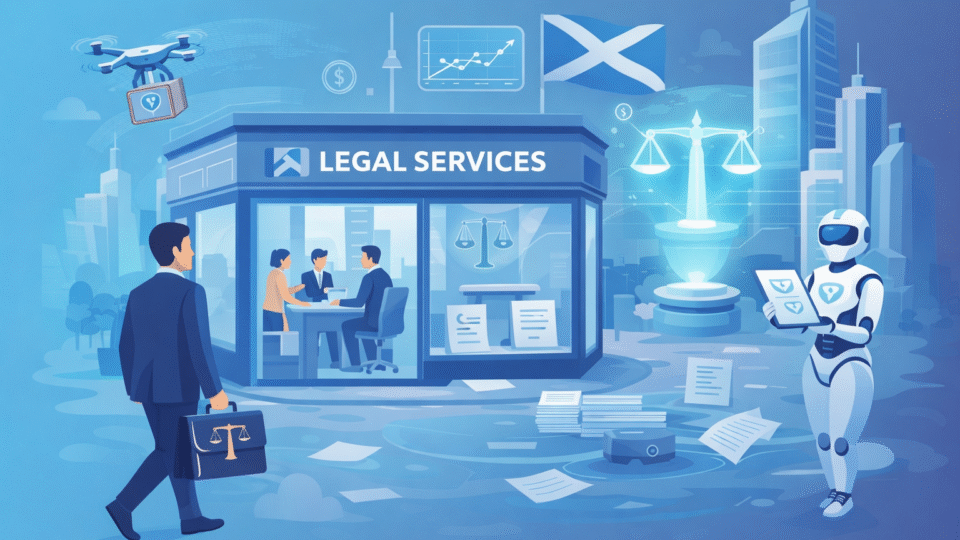Written by:

Grant Yuill
Head of Marketing & Customer Engagement
A recent research report from The Law Society of Scotland has shed new light on how smaller Scottish law firms are grappling with technology and the findings go far beyond software or systems.
What’s emerging is a picture full of paradoxes: tech brings speed but also stress, progress but also pressure, accessibility but also overwhelm. It’s not just a question of what tools we’re using – it’s about how we’re using them, and what that’s doing to the people behind the practice.
Here’s what stood out to me from the report, and how I believe firms can move forward with clarity and confidence.
1. High Use of Microsoft Office & Teams – Low Uptake of AI
What this really means:
Firms continue to rely on familiar, traditional tools. There’s caution, not resistance, when it comes to adopting newer innovations like AI. That caution reflects real concerns: about risk, cost, complexity, and time.
My take:
We need to stop talking about AI like it’s some far-off innovation and start using it like the assistant we already have, just poorly trained. AI isn’t about hype; it’s about help. Think automated document summarising, jurisdiction-specific research, or even smarter diary management.
But don’t try to leap straight into AI transformation. Start small. Start where it’s relevant. Measure the results. And most importantly, integrate AI into the tools and case management systems your firm already uses. Don’t chase buzzwords. Solve problems.
2. Tech Has Increased Efficiency – But Also Expectations and Stress
What this really means:
Technology has made lawyers faster, but clients now expect them to be always on. That’s not sustainable. Efficiency has unintentionally raised the bar, not lowered the load.
My take:
Tech should empower, not exhaust. Use it to create boundaries as well as bandwidth. That could mean introducing automated progress updates for clients, setting clear expectations from day one, or using scheduling tools that protect deep work time.
Efficiency must come with expectation management or it becomes a treadmill.
3. 74% Say Tech Has Improved Client Interactions – But Also Made Them Harder to Manage
What this really means:
Yes, communication is easier, but also more chaotic. Clients expect instant responses and total visibility. That’s a tough balance for stretched teams.
My take:
Firms need structured digital pathways for communication. Shared client portals, document automation tools, and structured intake forms are not just nice-to-haves – they’re essential.
When you control the channel, you shape the expectation. Without that control, you’re just reacting.
4. Top Challenges for Partners: Cybersecurity (55%), Cost (54%), and Keeping Up (47%)
What this really means:
Leaders are facing digital overload. The pressure isn’t coming from any single system, it’s the cumulative weight of every tech decision, every integration, every security risk.
My take:
This is a shift in mindset. Cybersecurity is not a one-time investment it’s a habit. Costs aren’t just upfront; they hide in duplication, inefficiencies, and poor integration. And “keeping up” doesn’t mean doing everything, it means being ruthlessly selective about what matters.
Think like a portfolio manager, not a tech shopper. Strategy is about choosing what not to do.
5. Solicitors Say: Lack of Training, Trouble With External Systems, and Falling Behind
What this really means:
There’s a widening gap between partners and staff. Junior team members are often expected to “just figure it out” with new tech, especially tools from clients or third parties. The result? Frustration and friction.
My take:
Training must be ongoing and contextual. Don’t just teach tools teach workflows. Make space for learning. Assign internal tech champions. These are people who can be the go-to for certain systems and reduce support bottlenecks.
And above all, stop assuming people “should know this by now.” Knowledge takes time and support to stick.
Final Thought: Technology Is a Mirror, Not a Magic Wand
Here’s the truth: Tech won’t fix your firm. It will reflect it. The strengths and gaps already in place, your culture, your clarity, your systems and will all be magnified, for better or worse.
The firms that will thrive aren’t the ones with the most tools, but the ones with the sharpest thinking about how and why they use them.
So, if you’re a smaller firm feeling the pressure of change, of choice, of chaos, my advice is simple:
STOP trying to just adopt tech. START adapting around it.
Let it serve you. Let it scale your strengths. But never let it steer the ship.
Let’s Talk.
If your firm is navigating these tensions and you want to share what’s working, or ask for advice, I’d love to hear from you. Get in touch with me directly. No pressure, no pitch, just a conversation.
My email address is grant@denovobi.com.















